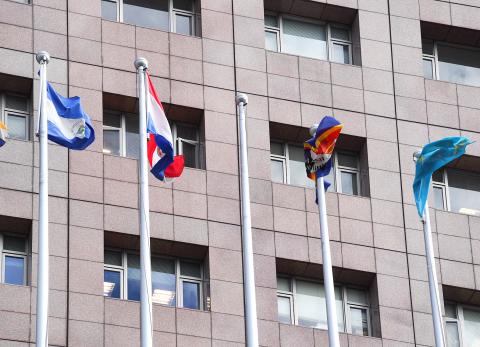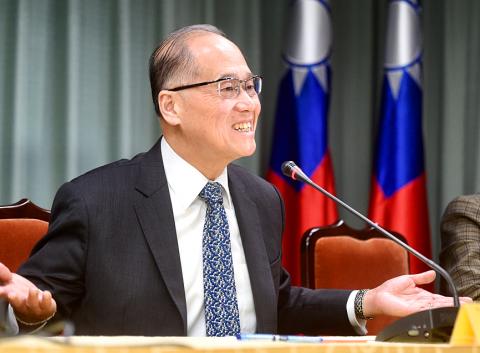The government yesterday expressed its regret over Sao Tome and Principe’s decision to cut its 19-year-old diplomatic ties with Taiwan, acknowledging that “gambling behavior” by the African nation was prompted by Taipei’s denial of its request for an exorbitant amount of financial aid.
Speaking at an impromptu news conference in Taipei, Minister of Foreign Affairs David Lee (李大維) said that to safeguard the nation’s dignity, Taiwan would immediately cut its diplomatic ties with Sao Tome and Principe, shutter its embassy and halt any cooperative programs with the African nation.
“Since the establishment of diplomatic ties in May 1997, Taipei has assisted Sao Tome and Principe in promoting national development, with our bilateral cooperation touching upon the areas of public health, medicine, agriculture, basic infrastructure, energy and education,” Lee said.

Photo: CNA
Singling out Taiwan’s antimalarial scheme in the African nation, Lee said thanks to continuous efforts by Taiwan’s malaria prevention counseling delegation, malaria incidence in Sao Tome and Principe fell from 50 percent in 2003 to 1.01 percent last year.
Despite Taipei’s determination to do its utmost to help its diplomatic allies promote national development, Lee said Sao Tome and Principe’s financial hole is simply too deep for Taiwan to deal with.
“Accordingly, it disregarded its nearly 20-year friendship with us and approached both sides of the Taiwan Strait to seek the highest bidder. We regret and deplore Sao Tome and Principe’s reckless and unfriendly decision,” Lee said.

Photo: Chien Jung-fong, Taipei Times
He added that the incident would not cease Taipei’s resolve to expand the nation’s international space and push its “steadfast diplomacy.”
Asked to confirm media reports that Sao Tome and Principe had asked the government for NT$6.4 billion (US$199.9 million), Lee declined to reveal the actual amount.
“It did ask for an astronomical number, but we refused to play the checkbook-diplomacy game,” Lee said.
“We would rather initiate programs that actually improve the welfare of the people of Sao Tome and Principe. The African nation’s need for money to fill its financial hole is neither Taiwan’s responsibility, nor is it something we are willing to do,” Lee added.
Asked whether Beijing had attempted to lure Sao Tome and Principe with money, Lee said the government did not have that information, but it was regrettable that Beijing would take advantage of the African nation’s financial position to consolidate its “one China” principle.
Lee also denied the severance of ties was due to the President Tsai Ing-wen’s (蔡英文) refusal to adhere to the so-called “1992 consensus,” which refers to a tacit understanding between the Chinese Nationalist Party (KMT) and the Chinese Communist Party that both sides of the Taiwan Strait acknowledge there is “one China,” with each side having its own interpretation of what “China” means.
“Frankly speaking, if we look at the case of the Gambia, which broke its diplomatic ties with Taiwan in November 2013 and established a formal relationship with Beijing in March this year, that all occurred when the precondition of the ‘1992 consensus’ was met,” Lee said, referring to then-president Ma Ying-jeou’s (馬英九) adherence to the “1992 consensus.”
On the possibility that a domino effect could be set off with the nation’s other diplomatic allies, particularly the Vatican, Lee said given the nation’s diplomatic situation, that pressure would be omnipresent.
Nevertheless, the Vatican, unlike secular nations, does not require financial aid, Lee said.
Meanwhile, the Mainland Affairs Council yesterday issued a strongly worded statement denouncing Beijing resorting to “checkbook diplomacy” in attempting to reinforce its “one China” policy and inducing Sao Tome and Principe to cut diplomatic ties with Taiwan.
“We hereby express our strong discontent and regret over the incident, which has hurt the feelings of Taiwanese, destabilized the Taiwan Strait and runs counter to Beijing’s oft-stated goal of pushing for the peaceful development of cross-strait relations,” the council said.
Stressing that the government has repeatedly demonstrated its goodwill since the Tsai administration took office in May, the council said it disapproved of China’s rigid mindset and its return to the “old path of confrontation,” urging Beijing to solemnly contemplate the possible consequences of its actions.

Auckland rang in 2026 with a downtown fireworks display launched from New Zealand’s tallest structure, Sky Tower, making it the first major city to greet the new year at a celebration dampened by rain, while crowds in Taipei braved the elements to watch Taipei 101’s display. South Pacific countries are the first to bid farewell to 2025. Clocks struck midnight in Auckland, with a population of 1.7 million, 18 hours before the famous ball was to drop in New York’s Times Square. The five-minute display involved 3,500 fireworks launched from the 240m Sky Tower. Smaller community events were canceled across New Zealand’s

The Ministry of Foreign Affairs (MOFA) yesterday said it is closely monitoring developments in Venezuela, and would continue to cooperate with democratic allies and work together for regional and global security, stability, and prosperity. The remarks came after the US on Saturday launched a series of airstrikes in Venezuela and kidnapped Venezuelan President Nicolas Maduro, who was later flown to New York along with his wife. The pair face US charges related to drug trafficking and alleged cooperation with gangs designated as terrorist organizations. Maduro has denied the allegations. The ministry said that it is closely monitoring the political and economic situation

‘SLICING METHOD’: In the event of a blockade, the China Coast Guard would intercept Taiwanese ships while its navy would seek to deter foreign intervention China’s military drills around Taiwan this week signaled potential strategies to cut the nation off from energy supplies and foreign military assistance, a US think tank report said. The Chinese People’s Liberation Army (PLA) conducted what it called “Justice Mission 2025” exercises from Monday to Tuesday in five maritime zones and airspace around Taiwan, calling them a warning to “Taiwanese independence” forces. In a report released on Wednesday, the Institute for the Study of War said the exercises effectively simulated blocking shipping routes to major port cities, including Kaohsiung, Keelung and Hualien. Taiwan would be highly vulnerable under such a blockade, because it

UNRELENTING: China attempted cyberattacks on Taiwan’s critical infrastructure 2.63 million times per day last year, up from 1.23 million in 2023, the NSB said China’s cyberarmy has long engaged in cyberattacks against Taiwan’s critical infrastructure, employing diverse and evolving tactics, the National Security Bureau (NSB) said yesterday, adding that cyberattacks on critical energy infrastructure last year increased 10-fold compared with the previous year. The NSB yesterday released a report titled Analysis on China’s Cyber Threats to Taiwan’s Critical Infrastructure in 2025, outlining the number of cyberattacks, major tactics and hacker groups. Taiwan’s national intelligence community identified a large number of cybersecurity incidents last year, the bureau said in a statement. China’s cyberarmy last year launched an average of 2.63 million intrusion attempts per day targeting Taiwan’s critical